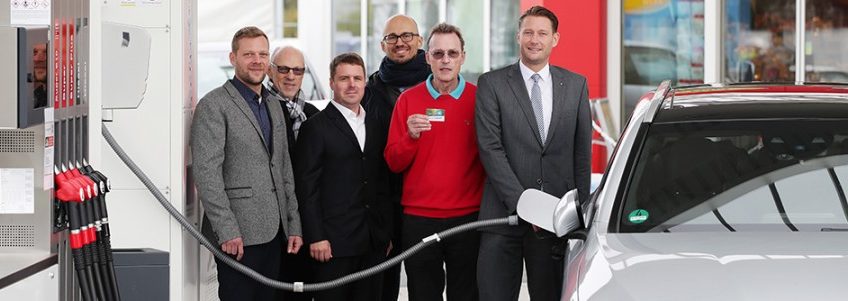In Bad Homburg v. d. Höhe, drivers of fuel-cell powered electric vehicles (FCVs) can now fill up with hydrogen (H2) at the Hessol filling station, Ober-Eschbacher-Strasse 142. H2 MOBILITY Deutschland is the owner and operator of the hydrogen filling station; the technology comes from the gases and plant manufacturer Air Liquide.
The Hessian city of Bad Homburg was awarded the funding for the construction of a hydrogen station in 2018 during H2 MOBILITY’s second call for locations. On the initiative of Gaertner & Roesebeck Unternehmensberatung GmbH, the Palliativteam Hochtaunus [palliative care group], and with the support of the city of Bad Homburg, many Bad Homburg citizens and companies had expressed their support for hydrogen as a fuel and made this clear with more than 70 statements of intent to purchase FCVs.
Today, Alexander W. Hetjes, the Lord Mayor of Bad Homburg v. d. Höhe; Andreas Fischer, Head of Hessol filling stations; Nikolas Iwan, Managing Director of H2 MOBILITY Deutschland; and Mirko Joppich, Project Manager Air Liquide Advanced Technologies, officially inaugurated the facility.
Network of hydrogen filling stations in Germany continues to grow
The network of stations at which FCVs can refuel with hydrogen is becoming progressively denser. There are now 76 H2 filling stations in Germany; by the beginning of 2020 there will be 100. The district seat of Bad Homburg is conveniently located on the A5 motorway and complements the hydrogen filling station network with connections to the Rhine-Main metropolitan region.
Operating a hydrogen fuel pump is intuitive for the driver; refuelling is similar to conventional vehicles and takes three to five minutes. The facility holds around 200 kilogrammes of hydrogen, enough to refuel 40 to 50 vehicles a day.
Hydrogen-powered e-mobility reduces CO2 emissions
Hydrogen is used to refuel electric vehicles with fuel cells. Its advantages: no noise, no pollutants, but the same use, speed, and range as passenger cars with gasoline or diesel engines. Hydrogen vehicles have ranges of 500 to 700 kilometres and can refuel in just three to five minutes. Hydrogen offers a climate-friendly way to expand the range of fuels available in the transport sector. Climate-damaging CO2 emissions can be significantly reduced, especially if the hydrogen is produced using renewable sources of energy.
The station in Bad Homburg is part of the Hydrogen Mobility Europe project, which receives funding from the Fuel Cells and Hydrogen 2 Joint Undertaking (FCH 2 JU, Grant Agreement No. 671438). The FCH JU is supported by the European Union’s Framework Programme for Research and Innovation (Horizon 2020), Hydrogen Europe, and the Hydrogen Europe Research Association.


